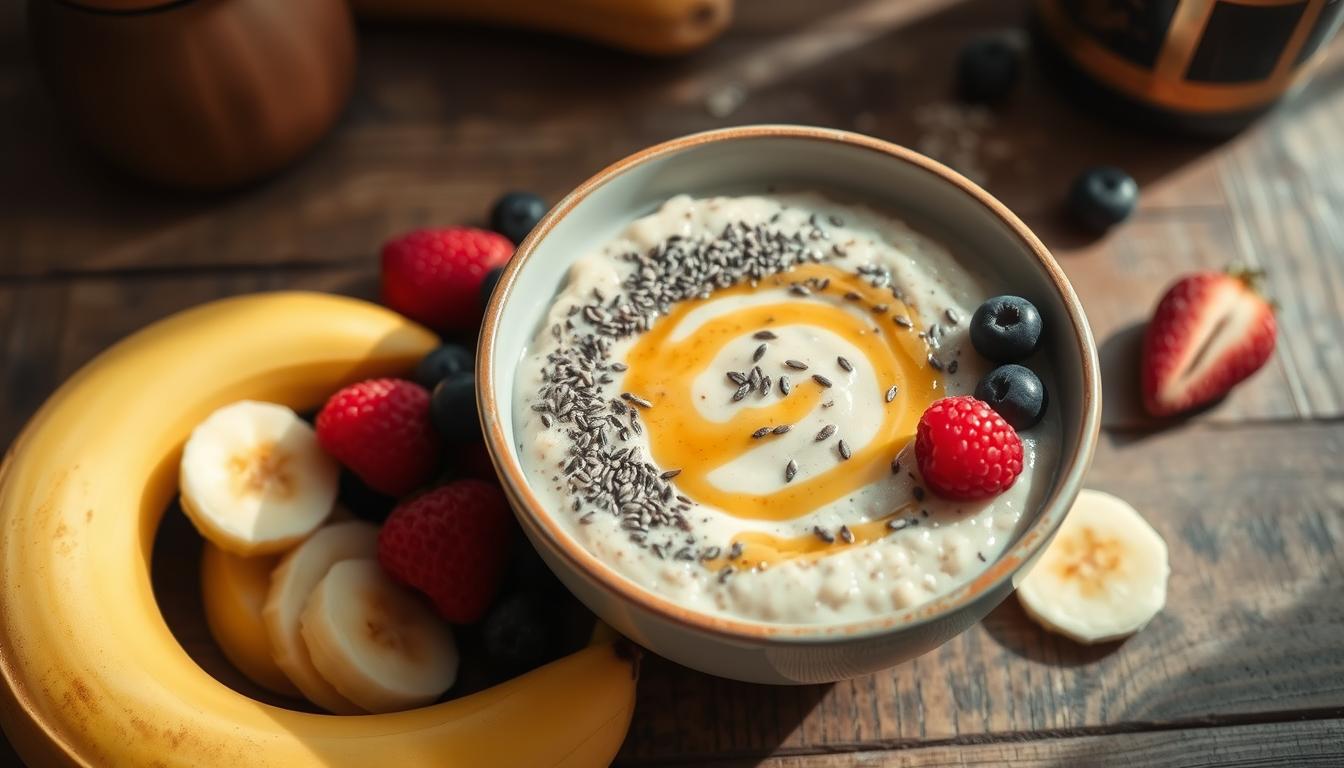Are you fighting the tough symptoms of fibromyalgia? Did you know a simple gluten-free porridge with chia seeds could help? About 79% of individuals with Irritable Bowel Syndrome (IBS) find porridge comforting in winter. This dish is full of fiber and nutrients, making it a great find.
Porridge from certified gluten-free oats is safe for those on a low FODMAP diet. It’s perfect for fibromyalgia sufferers. Oats, the main ingredient, are packed with soluble fiber. This fiber keeps you full and gives you steady energy all day.
What is Fibromyalgia and How Can Diet Help?
Fibromyalgia is a chronic condition that causes widespread pain, fatigue, and sleep issues. The exact cause is not known, but diet can help manage symptoms. Learn more about diet and fibromyalgia.
Understanding Fibromyalgia Symptoms
People with fibromyalgia feel pain more intensely. They also experience:
- Extreme fatigue and lack of energy
- Sleep disturbances and poor sleep quality
- Cognitive difficulties, such as “brain fog” and trouble concentrating
- Headaches, migraines, and sensitivity to sensory stimuli
The Role of Anti-Inflammatory Foods
An anti-inflammatory diet can help with fibromyalgia. It includes whole, unprocessed foods. Foods rich in antioxidants and omega-3 fatty acids are very helpful.
| Anti-Inflammatory Foods | Potential Benefits for Fibromyalgia |
|---|---|
| Fruits and vegetables | Provide essential vitamins, minerals, and antioxidants to reduce inflammation |
| Fatty fish (e.g., salmon, mackerel, sardines) | Rich in omega-3 fatty acids, which have anti-inflammatory properties |
| Nuts and seeds | Contain healthy fats, fiber, and anti-inflammatory compounds |
| Turmeric and ginger | Possess potent anti-inflammatory and pain-relieving effects |
Eating these anti-inflammatory foods can help manage fibromyalgia symptoms. It can also improve your overall health.
Benefits of a Gluten-Free Porridge with Chia Seeds
Gut Health and Fibromyalgia Connection
A gluten-free porridge with chia seeds is great for people with fibromyalgia. Chia seeds are full of omega-3s, fiber, and other nutrients that help your gut. Research shows a strong link between gut health and fibromyalgia, making gut-friendly foods key.
Chia seeds have lots of soluble fiber, which helps your gut stay healthy. This is vital for those with fibromyalgia, as they often face digestive problems like IBS. Adding chia seeds to your porridge can ease digestive issues and boost gut health.
Chia seeds are also rich in omega-3s, which fight inflammation. This is important for managing fibromyalgia symptoms. By mixing chia seeds with a gluten-free porridge, you get a breakfast that’s good for your gut and body.
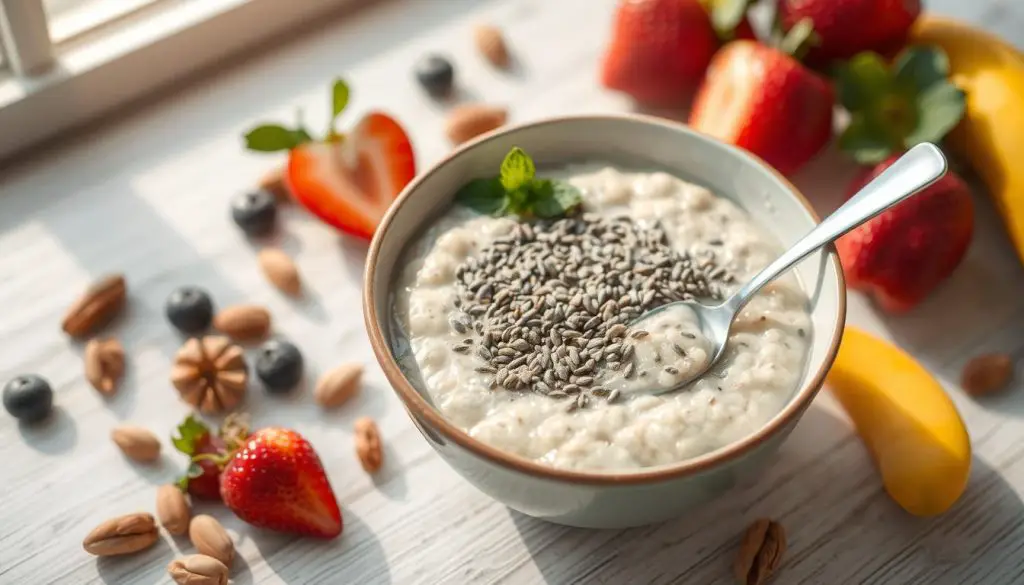
Adding a gluten-free porridge with chia seeds to your diet can greatly benefit your health. It nourishes your gut and reduces inflammation. This can lead to more energy, less pain, and better fibromyalgia management.
Gluten-free porridge with chia seeds for fibromyalgia
A Fibromyalgia-Friendly Breakfast
Starting your day with a nourishing breakfast is key for fibromyalgia sufferers. A gluten-free porridge with chia seeds is a great choice. Chia seeds are a superfood that offers many benefits for those with fibromyalgia.
This porridge is made with gluten-free grains like oats or quinoa. It’s also packed with chia seeds. Together, they provide a meal rich in fiber and nutrients. This helps control blood sugar, reduces inflammation, and keeps you energized all day.
Chia seeds are full of omega-3 fatty acids, antioxidants, and minerals. They’re perfect for boosting your overall health. By adding this gluten-free porridge for fibromyalgia to your morning, you get a fibromyalgia-friendly breakfast. It nourishes your body and helps ease fibromyalgia symptoms.
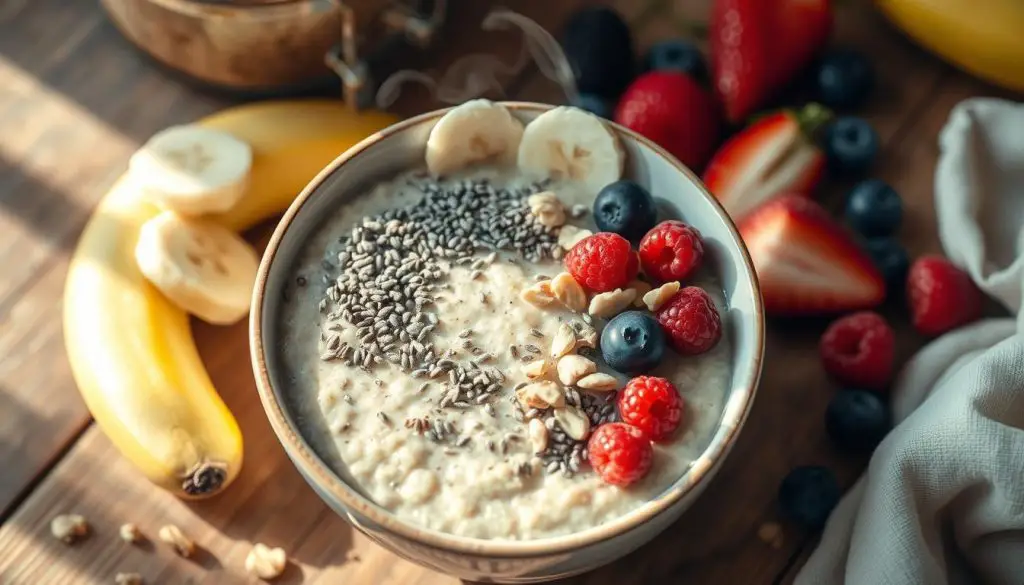
Chia Seeds: Tiny Nutritional Powerhouses
Chia seeds are tiny superstars that offer many benefits for fibromyalgia sufferers. They are full of anti-inflammatory omega-3 fatty acids, fiber, and other essential nutrients. These can help support health and manage chronic pain.
Plant-Based Nutrition for Chronic Pain Management
Eating more plant-based foods can help manage fibromyalgia symptoms. Chia seeds, for example, have 140 calories, 11 grams of fiber, and 4.4 grams of protein in 2 tablespoons. Flaxseeds have 78 calories, 4.2 grams of fiber, and 2.76 grams of protein in the same amount.
The high fiber in chia seeds helps with digestion and gut health. This is important for managing chronic pain conditions like fibromyalgia.
Chia seeds also have 18% of the daily recommended calcium. Adding more chia seed benefits and plant-based nutrition for fibromyalgia can help manage symptoms and improve well-being.
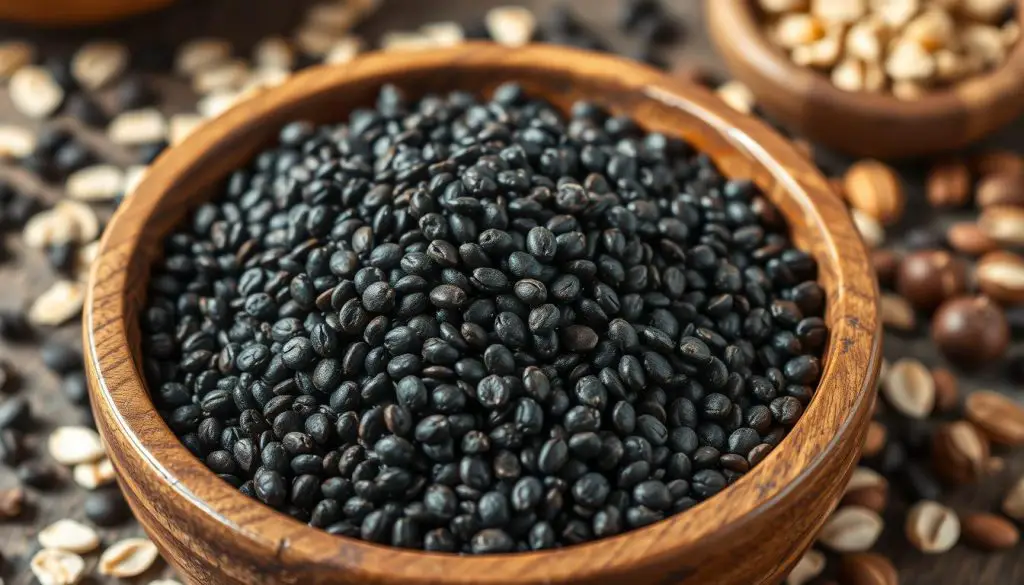
Ingredients for Gluten-Free Porridge
Making a tasty gluten-free porridge for fibromyalgia starts with picking the right ingredients. Traditional oats are common, but there are many gluten-free alternatives. These alternatives give your morning porridge a creamy, satisfying feel.
Gluten-Free Oat Alternatives
Try these gluten-free grains as the base for your porridge:
- Buckwheat flakes – They have a nutty taste and a creamy texture, making them a great gluten-free choice.
- Rice flakes – They are light and fluffy, adding a mild taste and smooth texture to your porridge.
- Amaranth – It’s packed with protein, fiber, and minerals, making it a nutritious option.
- Millet – It’s full of vitamins and minerals, adding a delightful crunch to your porridge.
- Quinoa – It’s known for its high protein, making it a fluffy and fiber-rich base.
- Buckwheat – A high-protein whole grain with fiber, it makes a creamy and satisfying porridge.
- Brown rice – It has a nutty flavor and a chewy texture, making it a versatile gluten-free option.
- Wheat berries – They have a crunchy texture and are nutrient-dense, adding a hearty touch to your porridge.
Use these gluten-free grains alone or mix them to make your ideal gluten-free porridge ingredients. Try different mixes and flavors to find your favorite breakfast for fibromyalgia.
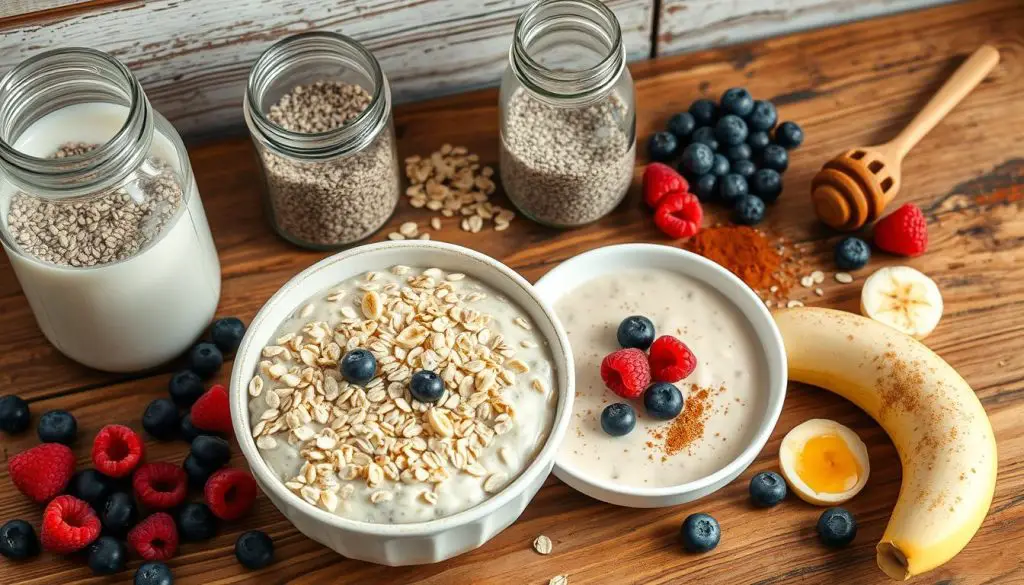
Step-by-Step Recipe Instructions
Creating a tasty gluten-free porridge recipe with chia seeds is easy. Begin by mixing gluten-free grains like oats or quinoa with a mashed banana, chia seeds, and your favorite milk or water in a bowl.
Chia seeds make the porridge thick and filling. You can cook it on the stovetop or in the microwave for a quick breakfast. Just heat the mix gently, stirring often, until it’s as thick as you like.
- In a bowl, mix together your gluten-free grains, mashed banana, chia seeds, and milk or water.
- Cook the porridge on the stovetop over medium heat, stirring frequently, until it reaches your desired thickness, about 5-7 minutes.
- Or, microwave the porridge for 2-3 minutes, stopping to stir every minute, until it’s heated through and thickened.
- Serve your gluten-free porridge warm, topped with your favorite fruits, nuts, or other toppings.
This easy how to make gluten-free porridge guide lets you enjoy a healthy and fulfilling breakfast. Try different gluten-free grains, spices, and toppings to find your favorite porridge mix.
Customizing Your Gluten-Free Porridge
This gluten-free porridge is perfect for making your own way. You can add your favorite toppings to make it special. It’s great for breakfast and fits your diet needs.
Tasty Topping Ideas
Make your gluten-free porridge more exciting with these toppings:
- Nuts and Seeds: Try almonds, walnuts, pecans, chia seeds, or flaxseeds for crunch and nutrition.
- Fresh or Dried Fruit: Add sliced bananas, berries, diced apples, raisins, or dried apricots.
- Nut Butters: Mix in almond, peanut, or cashew butter for protein and healthy fats.
- Spices and Sweeteners: Use cinnamon, nutmeg, vanilla, and honey, maple syrup, or natural sweeteners.
There are many ways to customizing your gluten-free porridge and gluten-free porridge toppings. Try different flavors to find your favorite breakfast.
Having fun with toppings is key to a great breakfast. Discover new flavors that are good for you and taste amazing.
Meal Prep Tips for Busy Mornings
For those with hectic schedules, preparing the base for your gluten-free porridge the night before can save valuable time in the morning. Just mix the dry ingredients, like gluten-free oats or quinoa flakes, and keep it in the fridge. In the morning, heat up the pre-made porridge base and add your favorite toppings for a quick, nutritious start.
To make mornings even easier, consider these additional gluten-free porridge meal prep tips:
- Batch cook a large portion of the porridge base on the weekend, then portion it out into individual servings to reheat throughout the week.
- Prepare toppings like fresh fruit, nuts, seeds, or nut butters in advance and store them in airtight containers for easy assembly.
- Use milk alternatives like almond, coconut, or oat milk to create a creamy texture that can be quickly heated up.
- Experiment with different flavor combinations, such as berry-vanilla or coco-blueberry, to keep your easy breakfast for busy mornings interesting and delicious.
With a little planning ahead, you can enjoy a nourishing, gluten-free porridge meal any day of the week, even on your busiest mornings.
High-Fiber Breakfast for Fibromyalgia Relief
Choosing the right foods for breakfast can really help with fibromyalgia. A high-fiber breakfast like gluten-free porridge with chia seeds is great. It can help with fatigue, muscle pain, and digestive problems.
This porridge is full of fiber from gluten-free grains and chia seeds. Fiber is key for digestion, gut health, and may lower inflammation. Eating a high-fiber breakfast can help manage fibromyalgia symptoms and improve your health.
The Benefits of Chia Seeds
Chia seeds are full of nutrients that help with fibromyalgia. They are:
- High in fiber, which helps with digestion and reduces inflammation
- Rich in omega-3 fatty acids, which fight inflammation and boost health
- A good source of protein, aiding in tissue repair and growth
- High in antioxidants, fighting oxidative stress and damage
Adding chia seeds to your fibromyalgia diet can improve your health. They help manage symptoms and support overall well-being.
A Balanced Breakfast for Fibromyalgia
A balanced, high-fiber breakfast is essential for fibromyalgia. Include whole grains, fruits, and vegetables in your porridge. This helps control blood sugar, gives lasting energy, and boosts health.
Choosing the right breakfast can help manage fibromyalgia symptoms. Try a high-fiber, nutrient-rich breakfast to improve your health and quality of life.
Incorporating More Anti-Inflammatory Foods
Adding more anti-inflammatory foods to your diet can help with fibromyalgia. These foods are rich in omega-3 fatty acids and antioxidants. They can reduce inflammation and help with chronic pain.
Some great anti-inflammatory foods to add to your fibromyalgia diet are:
- Fatty fish like salmon, mackerel, and sardines
- Leafy greens such as spinach, kale, and Swiss chard
- Berries, like blueberries and raspberries
- Nuts and seeds, including walnuts, almonds, and chia seeds
- Turmeric, a spice with the anti-inflammatory compound curcumin
- Avocados, full of healthy fats and antioxidants
By eating these anti-inflammatory foods for fibromyalgia, you can fight inflammation. This can help manage your symptoms and improve your health. A balanced diet is essential for your body’s healing.
Along with your gluten-free porridge, try to eat more anti-inflammatory foods every day. This approach can help you manage fibromyalgia better. It can also reduce chronic pain and other symptoms.
Gluten-Free Porridge in Your Fibromyalgia Diet Plan
Adding gluten-free porridge with chia seeds to your diet can help a lot. It gives you energy, fights inflammation, and boosts gut health. These are key for managing fibromyalgia.
Gluten-free porridge is becoming more popular. It’s part of 47 healthy breakfast recipes, with 3 being porridge. This shows more people want gluten-free breakfasts, helping those with fibromyalgia.
Chia seeds are also a big part of these recipes, with 5 out of 47 being chia seed-based. Chia seeds are great for fighting inflammation and improving gut health. Adding gluten-free porridge with chia seeds to your diet is a smart move. It helps manage symptoms and improves your health.
Source Links
- https://www.ibsclinics.co.uk/oats-and-porridge-ibs/
- https://www.healthline.com/nutrition/chia-seeds
- https://justglowingwithhealth.com/fall-spiced-pear-oatmeal/
- https://www.webmd.com/diet/foods-high-in-tryptophan
- https://nourishingmeals.com/diet/basic-elimination-diet
- https://kellik.com.au/healthy-overnight-breakfast-oats/
- https://maryvancenc.com/oatmeal-myth/
- https://www.realfoodforlife.com/11-gluten-free-grains/
- https://www.medicalnewstoday.com/articles/321683
- https://weehemp.com/blogs/the-kitchen/gluten-free-cbd-infused-protein-granola-bars?srsltid=AfmBOoqlCYImO-aPcBX3I2YH2FdEIYDn8TPqzOI6qlYZsgWpTCJoKeZj
- https://www.realfoodforlife.com/chia-seeds-are-a-superfood/
- https://www.wellandgood.com/chia-seeds-versus-flax-feeds/
- https://www.jillcarnahan.com/2014/05/16/6-signs-sibo-might-root-cause-ibs/
- http://caseythecollegeceliac.blogspot.com/2014/11/gluten-free-buckwheat-and-rice-porridge.html
- https://ohsheglows.com/5-minute-oatmeal-power-bowl/comment-page-1/
- https://www.healthline.com/nutrition/oatmeal-alternatives
- https://www.migraineagain.com/best-migraine-diet-breakfast-overnight-oats-n-berries/
- https://www.healthline.com/nutrition/gluten-free-diet
- https://www.healthline.com/nutrition/35-ways-eat-chia-seeds
- https://oshihealth.com/low-fodmap-foods-list/
- https://www.fireweedacupuncture.com/recipes
- http://caseythecollegeceliac.blogspot.com/2017/01/creamy-and-cozy-quinoa-flakes-three.html
- https://www.healthline.com/nutrition/what-to-put-in-oatmeal
- https://eatwellenjoylife.com/hemp-chia-for-breakfast/
- https://www.medicalnewstoday.com/articles/323164
- https://www.weightwatchers.com/au/blog/food/anti-inflammatory-diet
- https://www.lifeworkswellnesscenter.com/how-to-heal-your-gut-naturally/natural-gut-healing-questions-and-answers/what-is-the-30-day-gut-cleanse-diet.html
- https://www.celiac.com/celiac-disease/how-to-succeed-at-reducing-oxalate-on-a-gluten-free-diet-r3529/
- http://caseythecollegeceliac.blogspot.com/2020/01/healthy-meal-prep-breakfasts-gluten-free-recipes-new-year.html
- https://blog.katescarlata.com/fodmaps-basics/fodmaps-menu-and-snacks/
